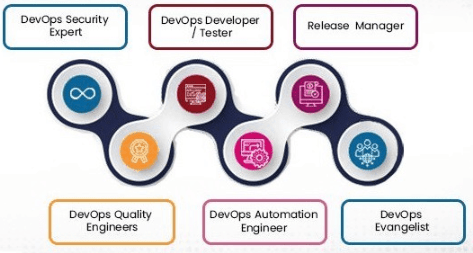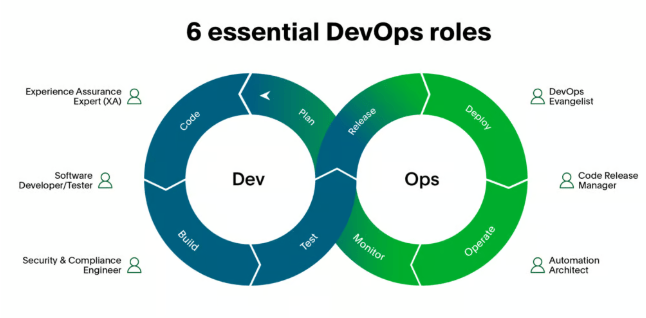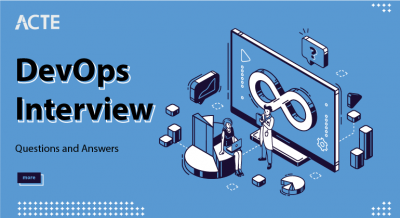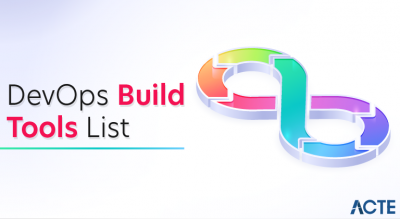
- Introduction to the DevOps Career Path
- Entry-Level Roles in DevOps
- Key Responsibilities of a DevOps Engineer
- Essential Skills for a DevOps Career
- Learning Path and Certification Roadmap
- Mid-Level DevOps Roles and Growth Opportunities
- Advanced DevOps Positions (Lead/Architect)
- DevOps in Different Industries (Tech, Finance, Healthcare)
- Challenges and Trends in DevOps Careers
- Job Market Demand for DevOps Engineers
- Salary Expectations at Different Experience Levels
- Conclusion
Introduction to the DevOps Career Path
Introduction to the DevOps Career Path DevOps has become a critical practice in the software development lifecycle, merging development (Dev) and IT operations (Ops) to improve collaboration, automate processes, and shorten the time to deliver high-quality software. The DevOps Training career path is diverse and offers a range of opportunities for individuals with a passion for technology and automation. Whether you are just starting your career or looking to advance your role in the industry, understanding the key stages and skills required for a successful DevOps career can help you navigate the ever-evolving landscape of modern software development. This article provides a comprehensive overview of the DevOps career path, from entry-level to senior leadership positions, focusing on skills development, career growth, and salary expectations.
Entry-Level Roles in DevOps
Entry-level roles serve as an excellent starting point for individuals starting their careers in DevOps. These roles typically aim to build foundational knowledge of DevOps practices, automation tools, and infrastructure management.
- DevOps Intern: A beginner role where you work alongside more experienced engineers, gaining exposure to various DevOps tools and practices, such as continuous integration/continuous delivery (CI/CD pipelines), version control, and scripting.
- Junior DevOps Engineer: In this position, you will begin to take on more responsibility, assisting in automating tasks such as deployments, monitoring, and system configuration. Junior DevOps engineers are also involved in maintaining and troubleshooting development Devops vs Agile.
- Build and Release Engineer: This is often an entry-level role where you focus on building, testing, and deploying code through automated processes. You will work closely with development teams to ensure the software is ready for release and maintain the build pipeline.
- Basic understanding of cloud platforms (AWS, Azure, GCP)
- Knowledge of version control (Git)
- Familiarity with scripting languages like Python, Bash, or Shell
- Knowledge of containerization and orchestration (Docker, Kubernetes)
- These roles serve as a stepping stone, providing practical experience and a solid foundation for career advancement in DevOps strategies.
- Continuous Integration and Delivery: Building and maintaining automated CI/CD pipelines to integrate and deliver code changes quickly and efficiently.
- Infrastructure Automation: Using tools like Terraform, Ansible, or Puppet to automate the provisioning and management of infrastructure.
- Monitoring and Logging: Setting up and managing monitoring tools like Prometheus, Grafana, AWS CloudWatch, and Devops Engineer Roles and Responsibilities to ensure systems are running smoothly.
- Configuration Management: Ensuring systems are consistently configured across environments using configuration management tools.
- Collaboration and Communication: Working closely with development, quality assurance, and operations teams to ensure alignment on processes and goals.
- Security Integration: Implementing security measures across the pipeline to ensure that applications are secure from the development phase to production. DevOps engineers are responsible for balancing rapid software delivery and system reliability.
- Technical Skills: Programming and Scripting Knowledge of programming languages (e.g., Python, Go, JavaScript) and scripting languages (e.g., Bash, PowerShell) for automating tasks. Cloud Platform Familiarity with major cloud providers (AWS, Azure, GCP) and the ability to manage infrastructure on these Cloud Platforms. Containerization and Orchestration Expertise in Docker and container orchestration tools like Kubernetes for managing containerized applications. CI/CD Tools Experience with tools like Jenkins, GitLab CI, CircleCI, and Travis CI to implement continuous integration and delivery CI/CD pipelines. Infrastructure as Code (IaC) Proficiency with IaC tools like Docker Images and Containers , CloudFormation, and Ansible to automate infrastructure provisioning. Version Control Familiarity with Git and GitHub/GitLab/Bitbucket for managing source code and collaborating with teams.
- Soft Skills: Problem-Solving: DevOps engineers often troubleshoot and resolve issues that arise during the deployment process. Collaboration and Communication DevOps strategies involves high cooperation between teams, requiring strong interpersonal communication skills. Adaptability to new tools and technologies is crucial as DevOps practices evolve rapidly. Attention to Detail DevOps engineers must be meticulous when designing automation scripts and managing infrastructure, as minor errors can lead to big problems.
- Gain knowledge in programming, operating systems, and networking.
- Learn version control (e.g., Git) and scripting languages.
- Get hands-on experience with cloud providers like AWS, Azure, or GCP.
- Understand how cloud resources (compute, storage, networking) work.
- Learn to use CI/CD tools (Jenkins, GitLab).
- Get comfortable with configuration management tools (Ansible, Chef, Puppet).
- Gain proficiency in Docker and Kubernetes for containerization and orchestration.
- AWS Certified DevOps Engineer – Professional
- Certified Kubernetes Administrator (CKA)
- Azure DevOps Solutions Expert
- Google Cloud Professional DevOps Engineer
- DevOps Architect: DevOps architects are responsible for designing the organization’s DevOps strategies, infrastructure, and toolchains. They also decide on the architecture of CI/CD pipelines, container orchestration, and cloud infrastructure.
- DevOps Manager/Director: A leadership role involves managing a team of DevOps engineers, setting goals, improving processes, and Why Devops and How It Works For Federal Agencies with other departments to align DevOps strategies with business objectives.
- Cloud Infrastructure Engineer: Focuses on designing and managing the underlying infrastructure on cloud platforms, with a strong focus on scalability, high availability, and security.
- Principal/Lead SRE: A senior position where the engineer leads efforts to maintain high availability, low latency, and fault tolerance of applications and services.
- Tech: DevOps practices are heavily adopted in the tech industry, which focuses on fast software delivery, cloud scalability, and microservices architecture.
- Finance: In finance, DevOps professionals work to ensure high levels of security, compliance, and availability while maintaining agility in delivering software updates.
- Healthcare: Healthcare organizations emphasize compliance (e.g., HIPAA), data privacy, and system reliability, where DevOps Training plays a critical role in automating testing, deployment, and monitoring. In all industries, the goal is to deliver high-quality software quickly while maintaining system reliability and security.
- Tool Overload: The vast number of DevOps tools available can be overwhelming. Cloud engineers often face the challenge of choosing the right tool.
- Integration Complexity: Integrating Docker Container practices into legacy systems or traditional development environments can be difficult, requiring significant planning and effort.
- Security Concerns: Security challenges grow as DevOps environments become more automated and distributed. Integrating DevSecOps into the pipeline is essential to ensure security from the outset.
- AI and Automation: Emerging trends like AI-powered DevOps automate more aspects of the development lifecycle, offering new opportunities and challenges for DevOps professionals.
- Entry-Level: $60,000 to $90,000 annually
- Mid-Level: $90,000 to $130,000 annually
- Senior-Level: $130,000 to $180,000+ annually
- DevOps Architect/Manager: $160,000 to $200,000+ annually
Key skills for entry-level roles include:
Become a Devops expert by enrolling in this Devops Online Training today.
Key Responsibilities of a DevOps Engineer
As a DevOps engineer, your role is focused on bridging the gap between software development and IT operations. You are responsible for creating a seamless pipeline that automates testing, building, and deployment processes and maintaining the health of applications in production.
Key responsibilities include:

Essential Skills for a DevOps Career
Specific technical and soft skills are crucial to succeeding in a DevOps career. Here’s a breakdown:<>p
Advance your Devops career by joining this Devops Online Training now.
Learning Path and Certification Roadmap
The learning path for a DevOps engineer typically starts with a foundational knowledge of software development and system administration. To succeed in the field, follow these steps:
Learn Basic Development and System Admin Concepts:
Explore Cloud Platforms:
Master DevOps Tools:
Obtain Relevant Certifications:
These certifications demonstrate expertise and can significantly enhance your resume when applying for DevOps roles.
Ready to excel in Devops? Enroll in ACTE’s Devops Master Program Training Course and begin your journey today!
Mid-Level DevOps Roles and Growth Opportunities
DevOps engineers take on more complex responsibilities at the mid-career level, including leading projects and mentoring junior engineers. Some typical mid-level roles include, DevOps Engineer (Mid-Level) professionals are highly proficient in implementing and maintaining CI/CD pipelines, automating cloud infrastructure, and ensuring security and performance. Site Reliability Engineers (SRE) have a similar role to DevOps engineers but focus more on ensuring system reliability, AWS Devops Tools for Cloud Build and Deployment , and scalability. DevOps Lead role involves overseeing the DevOps process, managing a team of engineers, and ensuring that best practices are followed in automating infrastructure and deployments. At this stage, you may also begin specializing in a particular domain, such as cloud architecture, security, or automation.
Advanced DevOps Positions (Lead/Architect)
Advanced DevOps roles typically involve strategic planning, team leadership, and the design of large-scale systems. Key positions include:
Advanced roles require deep DevOps tools, cloud infrastructure, and team management expertise. They often require a combination of technical prowess and leadership skills.
Are you getting ready for your Devops interview? Check out our blog on Devops Interview Questions and Answers!
DevOps in Different Industries (Tech, Finance, Healthcare)
DevOps engineers are in demand across various industries. Each sector has unique challenges and requirements that influence the implementation of DevOps practices:

Challenges and Trends in DevOps Careers
Job Market Demand for DevOps Engineers
The demand for DevOps engineers continues to rise as organizations across industries adopt DevOps practices to streamline software development and improve efficiency. According to recent surveys, DevOps has become one of the most sought-after skills in the IT job market. The growth in cloud computing and automation tools contributes to the increasing demand for skilled professionals.
Salary Expectations at Different Experience Levels
Salary expectations for DevOps engineers vary depending on experience, location, and industry. However, some average salary ranges include:
Salaries are often higher in tech hubs like Silicon Valley or New York City and may vary depending on the company’s scale and the complexity of the systems in place.
Conclusion
The DevOps career path offers tremendous growth opportunities, from entry-level to senior leadership roles. Individuals can build a rewarding career in DevOps Training dynamic field by gaining hands-on experience, mastering essential tools, and obtaining relevant certifications. As organizations continue to embrace DevOps practices to improve efficiency and collaboration, the demand for skilled DevOps professionals will remain high, making it a promising career choice for tech enthusiasts.



